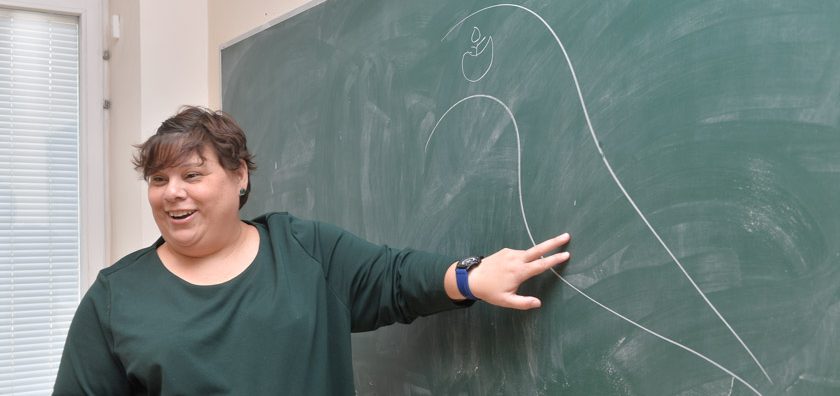
Mykolas Romeris University (MRU) English language Lecturer Kristina Schimmels not only teaches, but has also helped establish a Vilnius Book Club and enjoys cooking and taking in the sights of Vilnius during her spare time. Her true passion, however, is teaching.
This past summer, after her mother, Mary, passed away in Oklahoma, Mykolas Romeris University (MRU) Lecturer Kristina Schimmels did not visit the U.S. as she did every summer for the past 8 years.
Despite cousins and siblings who still live in Oklahoma and friends in Chicago, she said she feels “less inclined to go back.“
“I spent most of July crying,“ said Schimmels, who is still mourning the death of her 81-year-old mother, who passed away in March. A member of the Indian Choctaw tribe, she now calls Vilnius home.
How did you end up in Vilnius?
I was living in China. I was constantly getting sick there. I had friends in Vilnius, who were teaching at the Pedagogical Institute. They knew someone who was looking for an English language lecturer. I sent my resume and got a job at MRU in 2013. I‘ve been here ever since. I teach English for Specific Purposes, Foreign Language Teaching Methods and Modern English and Literature courses. I love my students.
So you came to Vilnius from China? What did you know about Lithuania before coming?
I never expected to move to Lithuania, in the first place. I‘ve always known about Lithuania, but I never expected to live here because it was the Soviet Union, when I was growing up. Also, I had heard about Lithuania from basketball player, now basketball executive Don Nelson who visited Lithuania and played here decades ago. He came to our house, when he got back from Lithuania and told my family how much he liked Lithuania. So, I always knew where Lithuania was, but I never thought I‘d end up here.
You have American Indian blood and belong to the Choctaw tribe. Is there interest about your heritage in Vilnius?
Yes, sometimes I visit schools in Vilnius and nearby cities. I get the opportunity to talk about my heritage at these schools, about Indian customs and the Choctaw language. I have beaded jewelry and a necklace that my grandmother gave me that I treasure. Indians like making colourful beaded jewelry that they sometimes sell.
Do you celebrate any American Indian holidays?
Traditionally, at the beginning of September there is an American Indian POW WOW festival held. I can not attend because classes begin and I must teach. It is a great opportunity for fellow Indians to meet, sing, dance and renew friendships. Some of the dancers appear in traditional Indian costume. It's a great event.
You are an avid reader and have started a Vilnius book club that meets about once a month. How did this idea come about?
I didn‘t start the book club. There were 6 of us that came together and we all liked to read. There were 4 Americans and 2 Lithuanians from Vilnius University. Each month a different person selects a book for us to read. We meet after about a month, when we have finished the particular novel. Usually we meet in a cafe or a restaurant. One of our favourite meeting places is the Blue Lotus restaurant in Vilnius‘ center. This month we are reading John Steinbeck‘s travel journal called, “Travels with Charley.“
You are well-known as a great cook and hostess. What do you like to cook?
My favourite dish is the Cajun, Louisiana jambalaya. It‘s a Choctaw dish from my tribe which consists of rice, chicken, sausage and spices. I like it because it‘s easy to make and it‘s tasty. I cook it quite often.
Do you like Lithuanian food?
I love Lithuanian food. I really, really like cepelinai and koldūnai. I also enjoy stuffed cabbage rolls – balandėliai and potato pudding, kugelis with sour cream. However, I do not cook Lithuanian food, as it is too complicated. I go out to restaurants to eat Lithuanian food. We always go out for cepelinai. Near the University, at the Fabai cafe, you can get cepelinai Thursdays.
How is your Lithuanian?
I can get by, but I need to learn Lithuanian. I need to study more and learn more.
What are the advantages of living in Vilnius?
The public transport is a big plus. It‘s relatively inexpensive compared to the U.S. I don‘t drive a car and have not during the time I have been living in Vilnius. I can get around with the bus. I had some health issues. I had an injured knee and if not for public transport, I would have had to search for someone to drive me everywhere. I could get to doctor‘s appointments and the clinics in Vilnius by bus, despite my injured knee and leg. Also, Vilnius is a pedestrian city and you can walk almost everywhere. I enjoy walking around the city.
You have lauded the doctors here and the medical care. You are satisfied with the operation you had?
Yes and extremely happy that “Sodra“ picks up the tab for operations. I had two operations for foot injuries and never paid anything. For just one surgery in the U.S., I would have paid about $30,000, despite the fact that I have health insurance. But in the U.S. I was paying $500 per month for health insurance and my deductible was $1,000. I think socialized medicine, which they have in Lithuania, is a good thing.
Do you plan to stay in Lithuania and continue teaching?
I‘m going to teach here, until I die. I think I‘m going to live in Vilnius for years and years. My passion is teaching and students are my priority.